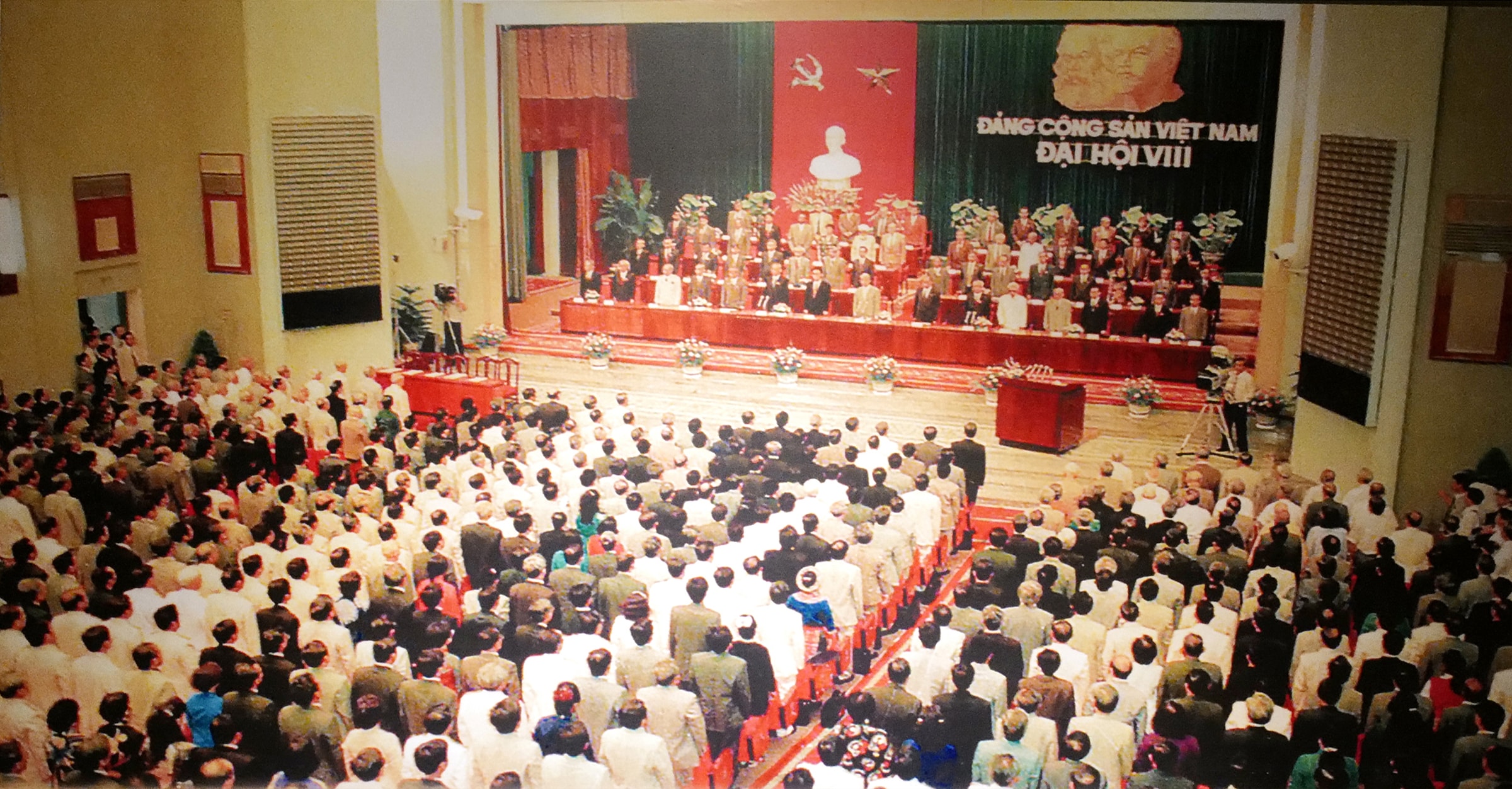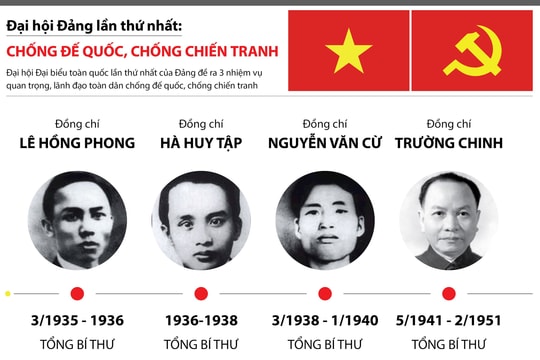The 8th Party Congress: Industrialization and modernization of the country
The Party Central Committee determined that it was necessary to continue innovation, moving the country to a new period of development - a period of promoting industrialization and modernization of the country.
8th Party Congress
Time:June 28 to July 1, 1996
Location: Hanoi Capital
Number of delegates attending the Congress:1,196
Number of party members in the country: more than 2 million
The congress elected:
- General Secretary: Comrade Do Muoi was re-elected as General Secretary.
(December 1997: Comrade Le Kha Phieu became General Secretary)
- Central Party Executive Committee: 170 official members
- Politburo: 19 members
- Central Executive Committee Advisor: ComradeNguyen Van Linh,Pham Van Dong,Vo Chi Cong.

GENERAL CONTEXT
- The collapse of the socialist regime in the Soviet Union and Eastern European countries caused socialism to temporarily decline, but that did not change the nature of the era; humanity was still in the transitional period to socialism.
The threat of a destructive world war has been pushed back, but armed conflicts, local wars, ethnic, racial and religious conflicts, arms races, intervention, subversion and terrorism still occur in many places.
The scientific and technological revolution continues to develop at an increasingly high level.
The Asia-Pacific region is dynamic, but also contains a number of factors that can cause instability.
- After 10 years of implementing the comprehensive renovation policy, the country has achieved remarkable successes in many aspects. The material life of the majority of the people has improved. Democracy has been promoted. The people's trust in the regime and the future of the country, in the Party and the State has been affirmed. Our country has emerged from the socio-economic crisis, but some aspects are still not stable.
In international relations, Vietnam has achieved great achievements: normalizing relations with the United States (July 1995), joining ASEAN (July 1995)... contributing to enhancing Vietnam's position in the international arena.
CONTINUE INNOVATION, INDUSTRIALIZATION AND MODERNIZATION OF THE COUNTRY
The Congress reviewed 10 years of comprehensive national renovation, 5 years of implementing the Resolution of the 7th Party Congress, set out goals, directions and solutions to promote national industrialization and modernization; and supplemented and amended the Party Charter.
The Congress made a general assessment: The renovation process over the past 10 years has achieved great achievements of great significance. The tasks set out by the 7th Congress have been basically completed. Our country has emerged from the socio-economic crisis, but some aspects are still not stable. The tasks set out for the first stage of the transition period, which is to prepare the premise for industrialization, have been basically completed, allowing for a transition to a new period of promoting industrialization and modernization of the country. The path to socialism in our country is increasingly defined.
Assessing the characteristics of the world situation, opportunities and challenges, the Congress determined: The goal of industrialization and modernization is to build our country into an industrialized country with a modern material and technical foundation, a reasonable economic structure, progressive production relations, suitable to the development level of the productive forces, high material and spiritual life, strong national defense and security, a rich people, a strong country, and a fair and civilized society.

The Congress established development orientations for key areas: Developing and shifting the economic structure towards industrialization and modernization; policies for economic sectors; continuing to innovate economic management mechanisms; developing science and technology, education and training; building an advanced culture imbued with national identity; policies to solve a number of social issues; national defense and security; foreign policy; implementing great national unity, promoting the role of people as masters; continuing to reform the state apparatus, building and perfecting the Socialist Republic of Vietnam.
The Congress also set out the direction and tasks of Party building to meet the requirements of the new period. That is, to maintain and strengthen the Party's working class nature. To improve the political capacity, qualities and capacity of cadres and Party members. To strengthen the Party's organization and strictly implement the principle of democratic centralism. To take care of building the cadre team. To improve the fighting capacity of grassroots Party organizations. To continue to innovate the Party's leadership methods. To innovate the Party's inspection and discipline work.
The Congress elected a Central Committee of 170 comrades. Comrade Do Muoi was re-elected as General Secretary of the Party. Comrades Nguyen Van Linh, Pham Van Dong, and Vo Chi Cong were appointed as Central Committee Advisors.
At the fourth conference in December 1997, the Central Committee accepted the proposal of comrade Do Muoi to resign from the position of General Secretary and elected comrade Le Kha Phieu as General Secretary of the Party. The Central Committee honored comrades Do Muoi, Le Duc Anh, and Vo Van Kiet as Advisors to the Party Central Committee.
DOMESTIC EVENTS
- February 14, 1996: Reopening of the Vietnam-China railway line.
-April 20, 1996: Senior Lieutenant General Tran Van Tra passed away.
- April 26, 1996: Vietnam issued international credit cards for the first time.
- August 15, 1996: Construction of Lang-Hoa Lac Expressway started
- September 24, 1996: Vietnam signed the Comprehensive Nuclear Test Ban Treaty (CTBT) in the US.
- October 31, 1996: Awarding the first Ho Chi Minh Prize to 77 exceptionally outstanding works, clusters of works, and clusters of works in science and technology, literature and art.
- November 12, 1996: The Law on Foreign Investment in Vietnam was passed at the 10th session of the 9th National Assembly (replacing the 1987 Law on Foreign Investment in Vietnam; amended laws 1990, 1992)
- November 28, 1996: Establishment of the State Securities Commission.
- December 24, 1996: Lawyer-Chairman Nguyen Huu Tho passed away.
- December 27, 1996: Inauguration of Dong Xuan market, Hanoi (the market burned down in 1994 and was rebuilt on the old foundation).
INTERNATIONAL EVENTS
- January 20, 1996: The first general election elected leader Yasser Arafat as the first President of Palestine.
- January 26, 1996: The US Senate passed the START-2 Treaty on reducing strategic nuclear weapons between the US and Russia.
- February 1, 1996: French President Jacques Chirac announced the end of nuclear testing.
- April 24, 1996: Russian President Boris Yeltsin met Chinese President Jiang Zemin in Beijing, opening a new era of relations between the two countries.
- May 29, 1996: Left-wing Likud Party leader Benjamin Netanyahu was elected Prime Minister of Israel.
- July 3, 1996: Boris Yeltsin defeated Communist Party leader Gennady Zyuganov to win a second term as President of Russia.
- September 10, 1996: The United Nations General Assembly adopted the Comprehensive Nuclear-Test-Ban Treaty (CTBT).
- November 5, 1996: Incumbent US President Bill Clinton was re-elected.
- December 9, 1996: The United Nations began authorizing the "oil-for-food" program in Iraq.
- December 17, 1996: The United Nations General Assembly elected Mr. Kofi Annan as Secretary-General of the United Nations.




